John Gilbert regularly tracks the mood of the UK consumer and periodically produces a Brexit Briefing based on questions added to the GfK UK consumer confidence barometer.
In December two questions were added to the CCB to mark the EU exit asking about whether the UK referendum was right or wrong to leave the EU and the second about if there was a referendum tomorrow on EU membership would you vote to leave or remain.
John has picked up some changes this year, he writes “what seems to have shifted this year is the impact Covid has had on the mood of the public towards the EU, with both the YouGov tracker and GfK polls showing a clear support to stay in the EU which is why the PM was so desperate to get over the line in now or never mode.” His full article follows.
Alone again in 2021
As we enter what seems set to be an even more challenging year in most peoples’ lives, the final separation from the EU adds to the rising worries of millions of workers and businesses already suffering from the impact of the pandemic.
End of the transition period EU exit polls reflect the deep uncertainty around Brexit with more people now believing the decision to leave was wrong.
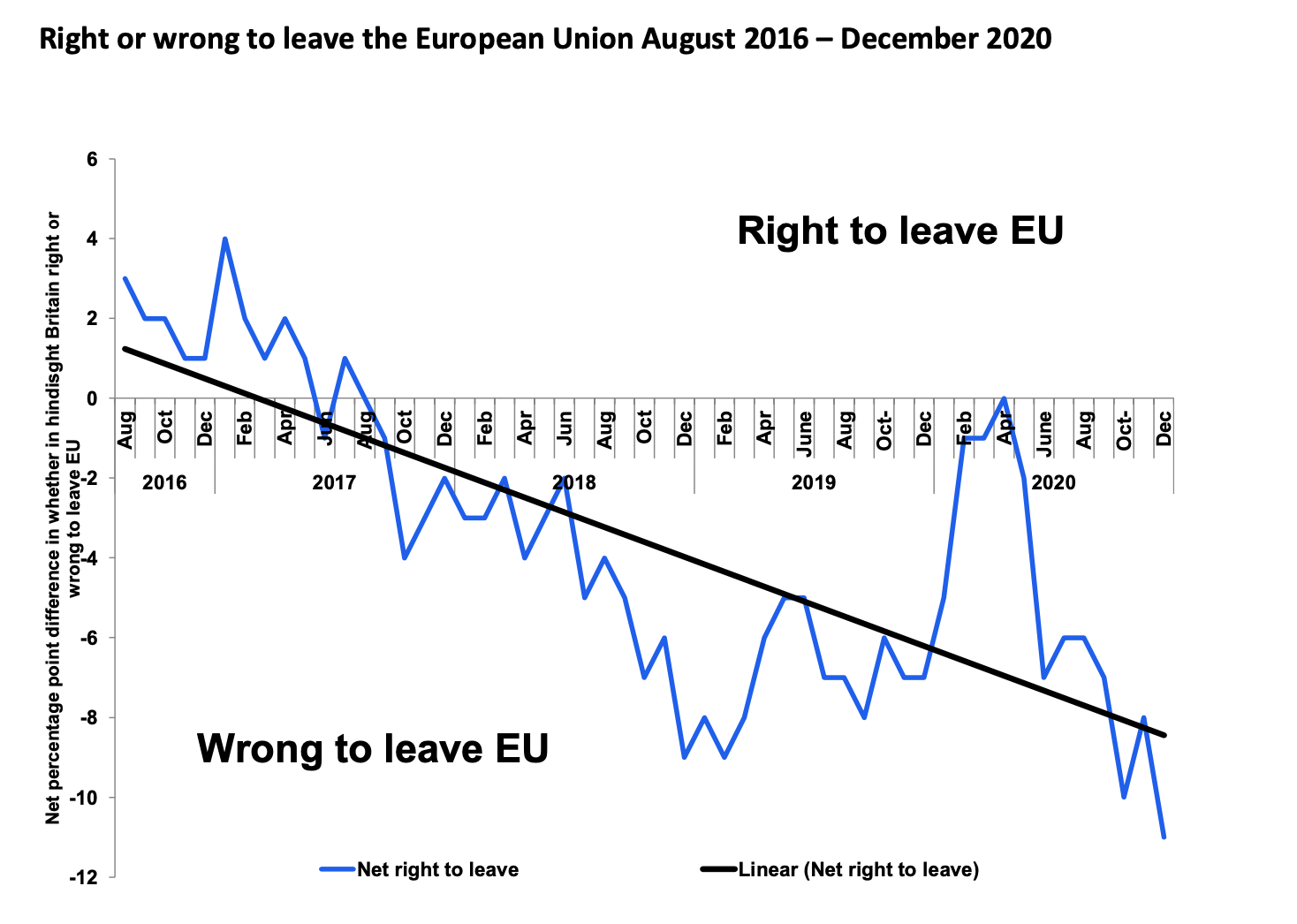
The latest YouGov poll (December 21/22) shows 51% believe the decision to leave was wrong with 40% believing the decision was right. While there is little change in attitudes among leave and remain voters more younger people who did not vote in 2016 may well see their futures far less secure outside Europe. Covid19 seems to have added to the shift.
Alongside the December UK Consumer Confidence Barometer run by GfK for The European Commission among 2,000 adults aged 16+, and showing a 7-point confidence jump to -26 (- 11, December 2019) on the back of the vaccine news, two additional questions were added to the survey.
The first was identical to the YouGov question: With hindsight do you think Britain was right or wrong to vote to leave the European Union, while the second asked people how they would vote if a second EU referendum was held today.
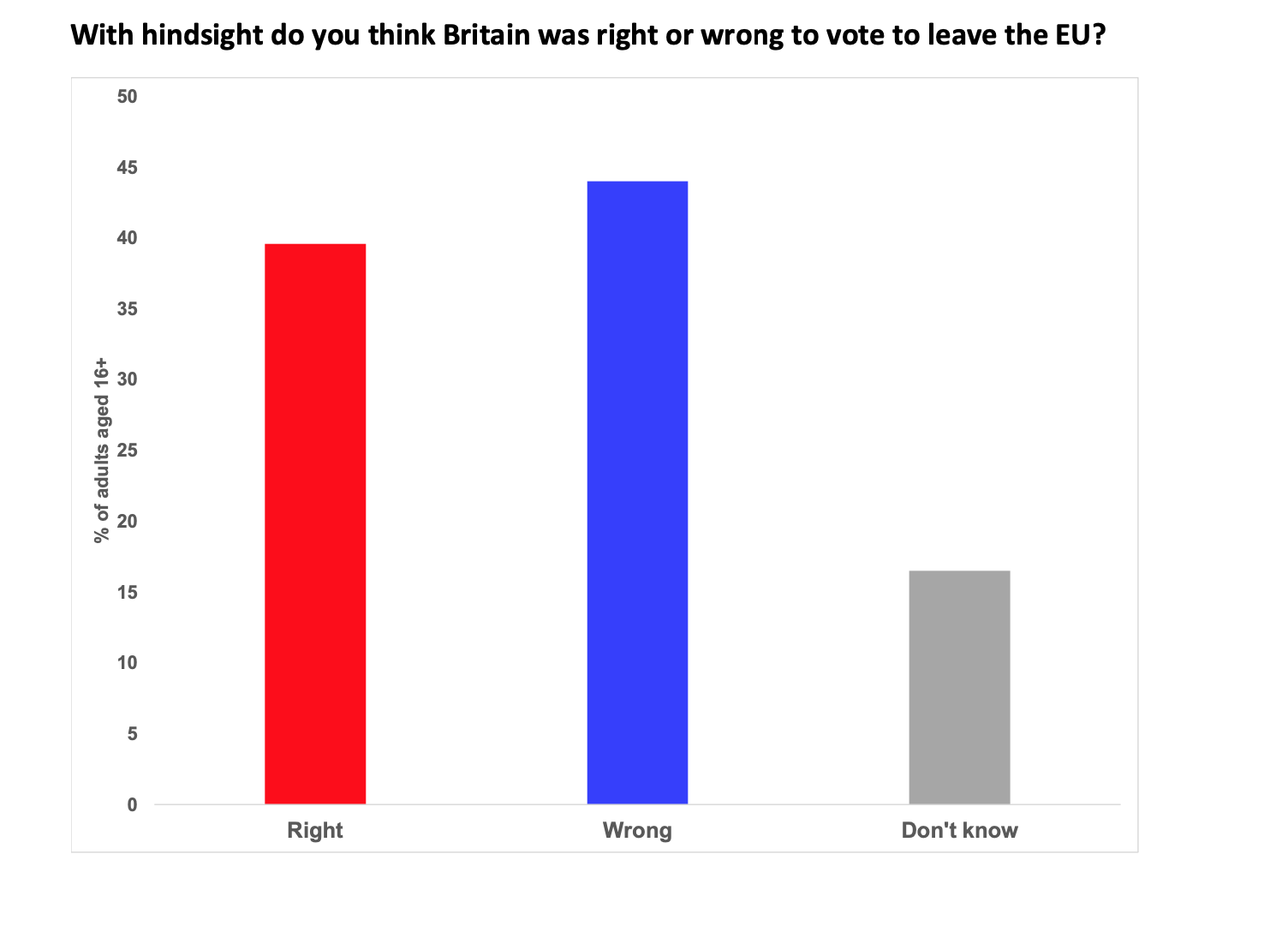
As in the YouGov tracker more people believe the 2016 Referendum decision is wrong although the GfK support for ’wrong to leave’ is less than the YouGov December measure. This may be the result of more people in the GfK poll being ‘don’t knows’ especially young people, with those aged 16-18, not captured in the YouGov survey with a starting age of 18.
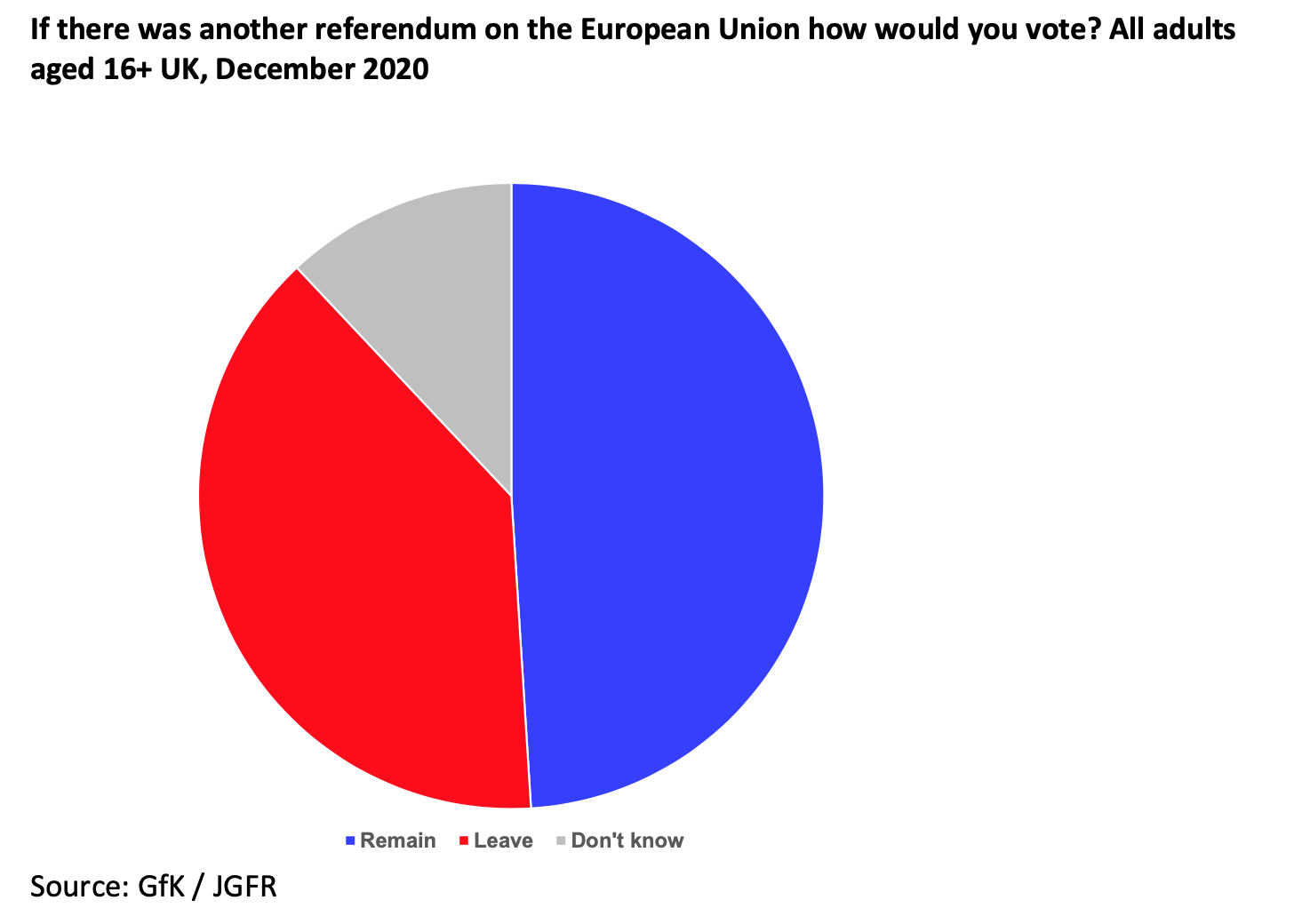
Far more revealing is the breakdown of responses in the second question: the question that was avoided a year ago in a second referendum when Parliament voted to stage a general election where seats rather than votes counted, unlike in 2016 when every vote counted.
In the GfK exit poll 49% would vote Remain and 39% Leave with 12% undecided. Excluding don’t-knows 56% would vote remain and 44% leave, highlighting the rush of the Johnson government to get Brexit done. The commonality of covid19 across the EU may have added to a sense of being part of a European battle against the virus.
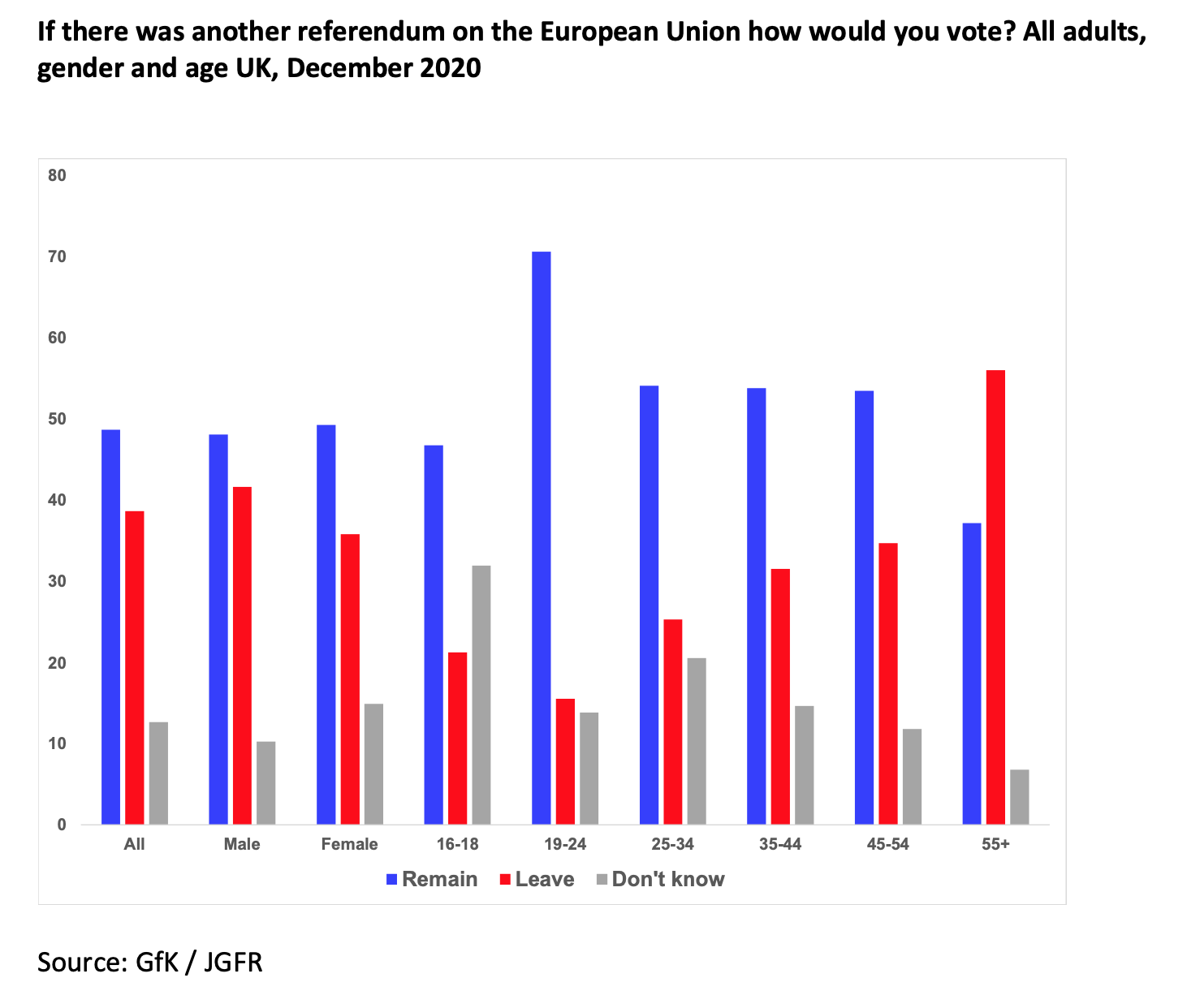
Across all age groups and across genders, apart from the over 55s, people would vote to stay in the EU. This is especially the case among the 19-34 age group where 59% would vote to remain (72.5% excluding don’t-knows).
People may now seem more certain of what they are giving up as new rules and regulations will come into effect from January 1st 2021 as part of taking back control. Despite the burdens on households and businesses from the pandemic, the calls to extend the transition period to ease adjustment were swiftly stamped on by the government for fear of never leaving.
With a trade deal now agreed with the EU preventing the chaos of a no deal, the 1,246 pages together with many summaries, side agreements and additional political declarations on a range of sensitive issues will have to be dissected by an army of lawyers and experts. Of glaring omission is no agreement on the vital financial services industry with several key European financial centres keen to take business away from London putting jobs at risk.
A YouGov poll on 30 December asked the public for their views on the deal agreed between the UK and EU.
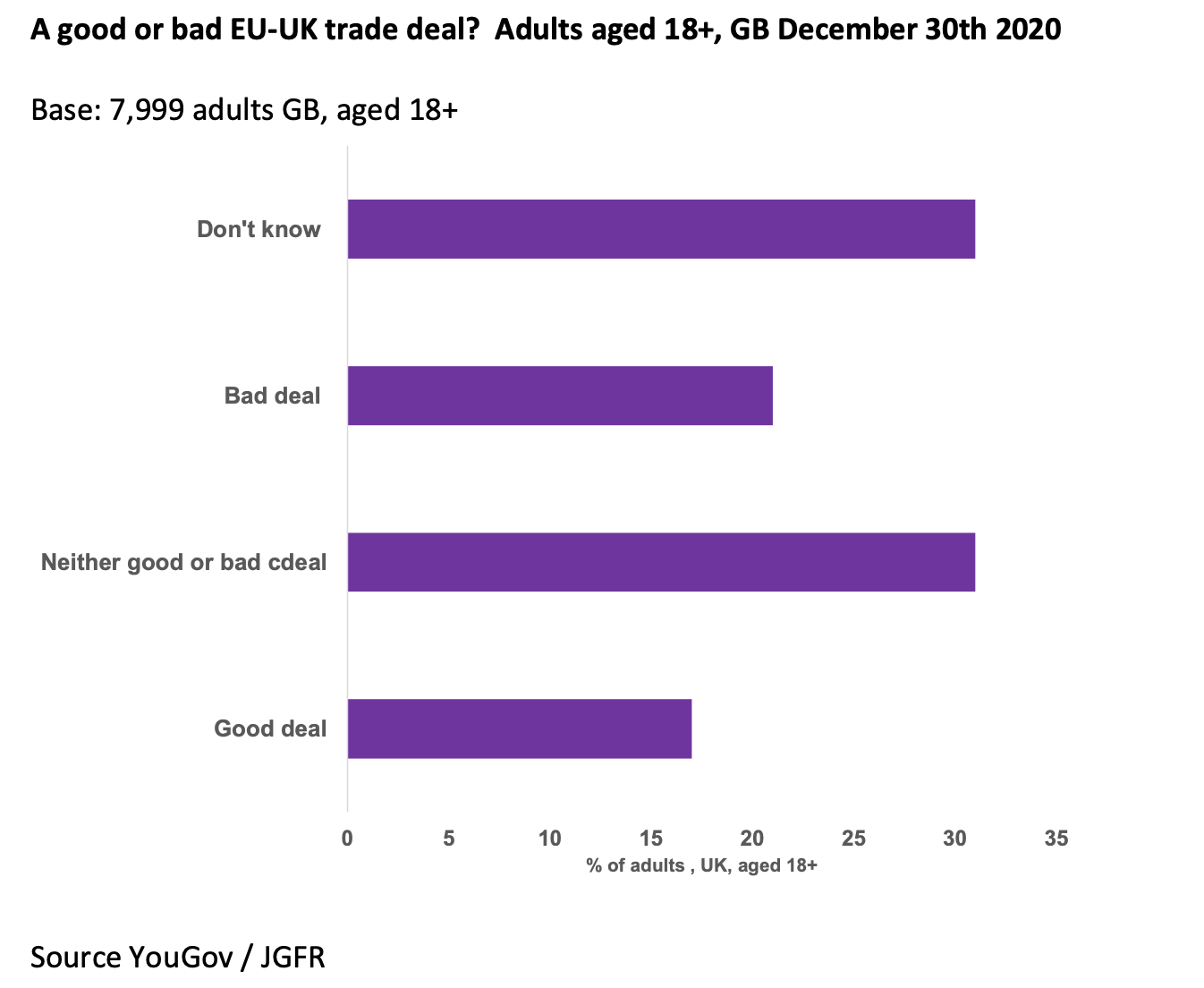
Given the ongoing surge in Covid19 cases, for many people the EU-UK interminable trade deal negotiations coming to an agreement appears to be of little interest. Only 46% of the public had a definite view with a slightly higher proportion feeling it to be a bad deal (21%) rather than a good deal (17%). Across age-groups only the Over 65s felt it to be positive ( 24% good vs 18% bad). As the political parties vote on the deal Labour and Liberal Democrat supporters firmly are in the bad deal camp (a net 32%) while a net 26% of Tory voters believe it to be a good deal.
The 2020s : A decade of generational conflict?
What is concerning about the UK’s future is that the generation who enjoyed the benefits of 47 years of EU membership have decided that the Britain of the 1960s was a superior version and will be their legacy. Much is made of the inequality across generations and the importance of education to the young in this pandemic; what is not talked much about is their future outside the EU which is what their lives will be about at a time when connectivity across borders takes control away from individual states (unless blocked).
For the generation who voted to leave a majority will not be around to see how they will be remembered on Brexit Day every January 31st as the 2020s and subsequent decades pass by. A majority will be retired and likely to be reflected in the only household income band that voted to leave.
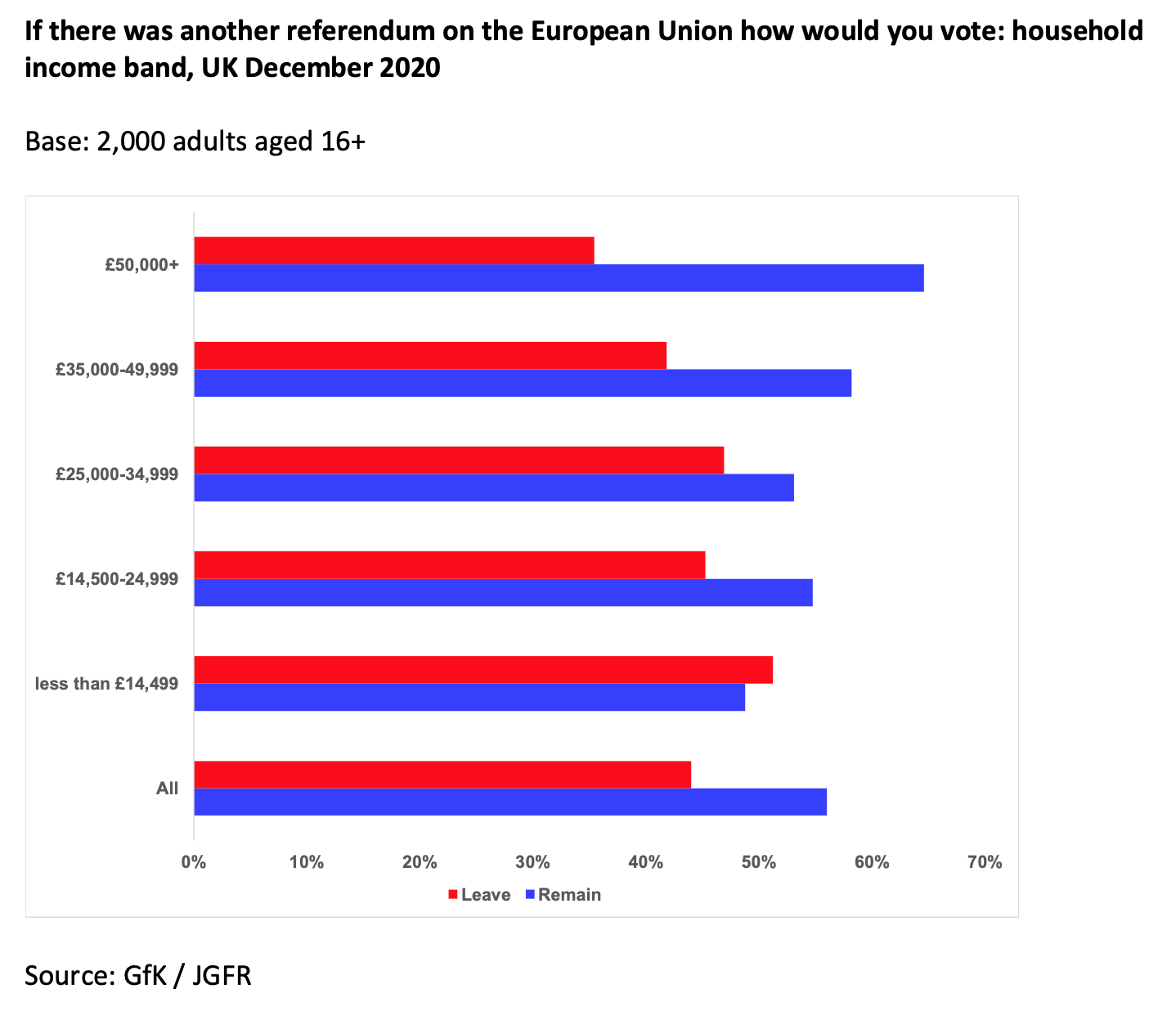
A United Kingdom post the EU divorce?
With a second Scottish referendum set to become the UK’s own divorce petition and Northern Ireland separated by a customs border in the Irish Sea, major constitutional questions following the EU divorce are set to grow.
Wales is also showing signs of frustration with the UK government over the Internal Markets Bill which sets out the powers transferring to the UK from the EU and how they will be applied to devolved administrations.
The application of the Internal Markets Bill threatens to intensify constitutional issues in the coming years. At stake is how common regulations and standards are applied across England and the devolved administrations after January 1st 2021.
With all 4 countries showing public opinion supporting staying in the EU the divisions that the Prime Minister seems so keen to end are set to increase as devolved administrations want their own say on how the UK’s own single market should evolve.
The costs of the EU divorce will continue to rise and the prosperity of all parts of the UK put at risk. Increasing numbers of people will wish Brexit had never happened with the pound- euro rate exchange rate a barometer of the financial markets views of how the relationship is working out.
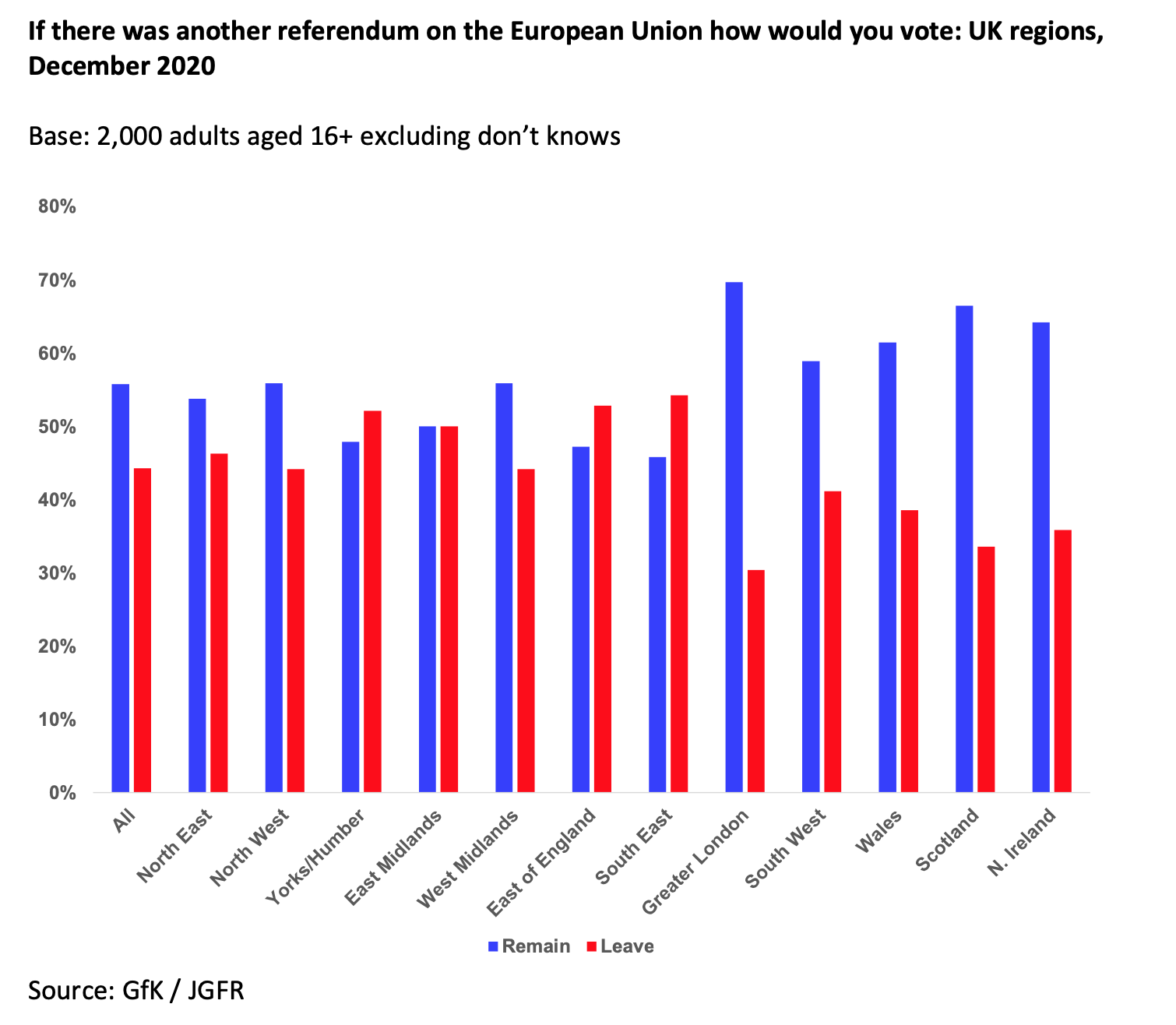
Across the UK regions only 3 regions would now vote to leave – Yorkshire / Humberside, the South East and East of England with the vote 50-50 in the East Midlands. In England 5 out of 9 regions voted to remain in the EU.
Among Remain voting regions London (70%) has the highest proportion of people who would vote to remain followed by Scotland (66%), Northern Ireland (64%), Wales (61%) and the South West (59%). In both the North West (56%) and North East (54%) there was a solid vote in favour of Remain despite containing many red wall constituencies.
Final thoughts on the end of the European dream?
While many Britons will have joined in the 250th anniversary celebrations of Beethoven’s birth this year there is little Ode to Joy this Christmas as Covid19 and Brexit came together around the Channel Tunnel. For millions of Britons the opening of the Channel Tunnel marked the real beginning of their European dream followed by the emergence of a new era of cheap air travel to Europe and new exciting lifestyles as new job opportunities and remote working in the EU gathered pace.
The Channel Tunnel is a fitting place for the lights of EU membership to finally go out as the Global Britain ship gets ready to sail in earnest, with wind power in its many manifestations all too evident – and not necessarily reliable. Too many marriages have ended in messy divorces that have blighted the lives of children.
With the British people now more uncertain about whether the 2016 Referendum vote was right and all but the older generation believing it was wrong, the dash to get Brexit done without addressing the inter-generation question of the future of the young outside the European Union will be the legacy of the Johnson government. How the younger generation reacts will determine whether Global Britain will succeed.
At the same time Covid 19 has highlighted the need for people to support communities for the common good and to reduce loneliness. Leaving the European Community may make 2021 a lonely year for the British people as they look for post-divorce support and guidance. Much seems to be riding on climate change.
